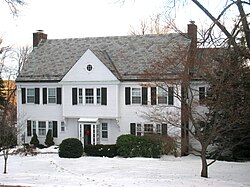Wallace Stevens
Wallace Stevens (October 2, 1879 – August 2, 1955) was an American poet. He was closely connected to the modernist movement.
Wallace Stevens | |
|---|---|
 Stevens in 1948 | |
| Born | October 2, 1879 Reading, Pennsylvania, U.S. |
| Died | August 2, 1955 (aged 75) Hartford, Connecticut, U.S. |
| Occupation |
|
| Period | 1914–1955 |
| Literary movement | Modernism |
| Notable works | Harmonium "The Idea of Order at Key West" The Man With the Blue Guitar The Auroras of Autumn "Of Modern Poetry" |
| Notable awards | Robert Frost Medal (1951) |
| Spouse | Elsie Viola Kachel (m. 1909–1955) |
| Children | Holly Stevens (1924–1992) |
| Signature |  |
He attended Harvard University. He received a degree from New York Law School in 1903. He practiced law for a number of offices and companies until 1916. In 1916, he got a job with the Hartford Accident and Indemnity Co. He worked for this insurance company for the rest of his life.[1]
While he worked in his business life, he also worked at writing poetry. He became friends with many other poets, such as William Carlos Williams, Marianne Moore, and E. E. Cummings.[2] In 1914 and 1915, he wrote poems that are now well-known such as "Peter Quince at the Clavier," "Disillusionment of Ten O'Clock," and "Sunday Morning."[1]
Harmonium, his first book of poems, came out in 1923. That book had other poems that are now famous, like “Thirteen Ways of Looking at a Blackbird," and “The Emperor of Ice-Cream."[3]
Stevens often wrote very long poems. "The Man with the Blue Guitar" (1937) had 33 parts. In poems like this and many others, Stevens talked about the power of imagination to change ordinary life.[3]
Books
- Harmonium (1923)
- Ideas of Order (1936)
- The Man with the Blue Guitar (1937)
- Parts of a World (1942)
- Transport to Summer (1947)
- The Auroras of Autumn (1950)
- The Necessary Angel (1951)
- The Collected Poems of Wallace Stevens (1954)
Wallace Stevens Media
Stevens's wife, Elsie, may have been a model for the national Walking Liberty half dollar when the couple lived in New York City
Stevens with B. R. Ambedkar, the father of the Indian Constitution, at Columbia University on June 5, 1952
Related pages
References
- ↑ 1.0 1.1 Stevens, Wallace (1997). Wallace Stevens: Collected Poetry and Prose. New York, NY: Library of America. pp. 959-969. ISBN 978-1-88301145-1.
- ↑ "About Wallace Stevens | Academy of American Poets". poets.org. Retrieved January 13, 2023.
- ↑ 3.0 3.1 "Wallace Stevens". Poetry Foundation. January 12, 2023. Retrieved January 13, 2023.


